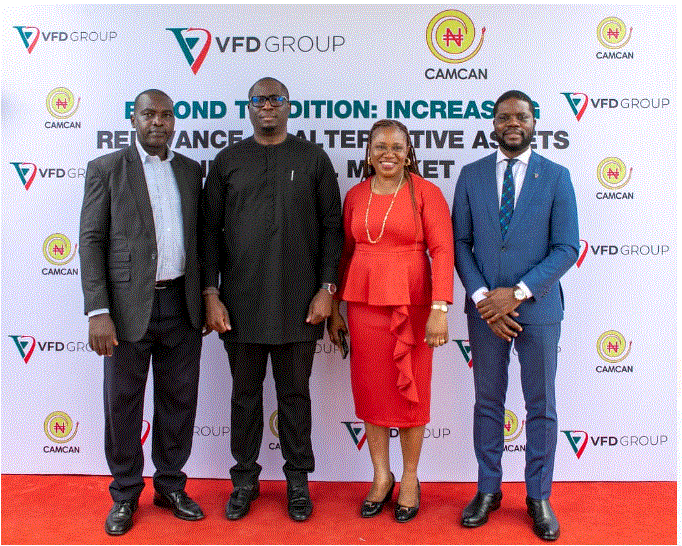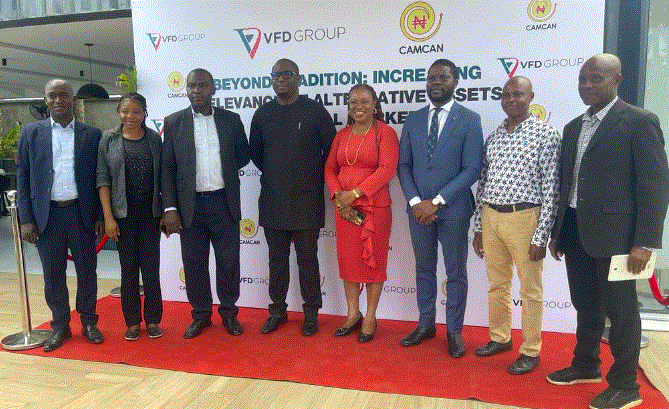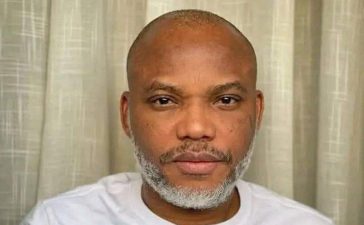Creatives in the Media and Entertainment Industry may soon have cause to smile as the need to create increased financing for the entertainment and media industry and as well boost foreign exchange earnings and economic development formed the core of conversations at the Quarterly Forum of the Capital Market Correspondents association hosted by the VFD Group in Lagos on Tuesday.

L-R, Vice Chairman, Capital Market Correspondents Association of Nigeria (CAMCAN), Friday Ekeoba; Managing Director of Splitar Limited, Folagbade Adeyemi; Chairman CAMCAN, Chinyere Joel-Nwokeoma; and Head Marketing & Corporate Communications of VFD Group, Muyiwa Olowoporoku during the CAMCAN Quarterly Forum hosted by VFD Group with the theme “Beyond Tradition: Increasing Relevance of Alternative Assets in Capital Market” in Lagos, Herel Play, Ikoyi on Tuesday.
Speaking at the event, Managing Director, Splitar Limited, Folagbade Adeyemi, disclosed that the group is actively pursuing an exchange platform tailored to the media and entertainment sector, offering diverse investment opportunities for both domestic and international investors.
He explained that SplitXchange, currently in its development stage by the group, would offer a platform for financing the media and entertainment industry, among other alternative assets.
He also revealed that VFD Group Plc’s proactive approach in spearheading an exchange platform specifically tailored to the media and entertainment sector led to the creation of SplitXchange as It aims to provide diverse investment opportunities for both local and international investors.
Addressing the theme, “Beyond Tradition: Increasing Relevance of Alternative Assets in Capital Market,” Adeyemi lamented the existing dearth of robust funding mechanisms in the country. He pointed out that despite Nigeria’s vast population of 208.8 million people, funding for the entertainment sector primarily originates from external sources.
Adeyemi underscored the potential of alternative assets, including Arts and Commodities, Real Estate, and Entertainment and Media (E&M). He noted that globally, the E&M sector boasts an average market size of $41 billion as of 2021, with an estimated growth rate of 4.2 percent. However, Nigeria’s earnings from the E&M sector stand at $5 billion, in stark contrast to the United States’ $750 billion and the United Kingdom’s $140 billion.
He also highlighted the absence of significant investments from Nigeria’s Pension Assets in the entertainment or streaming services sector, despite notable contributions from global giants like Netflix and Amazon. He emphasized the urgency to address liquidity, efficiency, and entry barriers in the country’s financial landscape.
In discussing the challenges faced by the entertainment sector, Adeyemi noted its reliance on the banking sector for funding, citing the sector’s exclusion from the organized financial sector due to intermediaries’ inability to recognize Intellectual Property (IP) as suitable collateral.
Moreover, he pointed out that traditional financial institutions are ill-equipped to assess industry opportunities due to poor visibility, data, and income leakages, resulting in mispricing and market illiquidity.
Conventional financing methods, according to Adeyemi, fail to provide efficient means for fractional ownership of valuable assets, thereby hindering market growth and restricting opportunities for both investors and asset creators.
He stressed the need to solve the problems of liquidity, efficiency, and barriers to entry in the country.
“In today’s market, the quick conversion of assets into cash is a challenge due to the absence of a well-structured marketplace that oversees and regulates these assets.
“The automation of processes such as compliance, escrow account management, dividend distribution, corporate action management, and drag-along actions technology presents a significant challenge in today’s alternative market.
“The high initial cost of assets in this market restricts participation to only affluent individuals and corporate investors,” he said.
Adeyemi explained that the entertainment sector as a self-starter is dependent on the banking sector as the primary provider of funding.
He noted that the sector remains excluded from the organized financial sector due to the inability of intermediaries to recognize Intellectual Property (IP) as a suitable collateral to access funding.
“Projects are financed informally through a network of angel investors, high net worth individuals, non-governmental organizations, government and personal savings,” Adeyemi said.
He further pointed out that “investors and asset creators face challenges when seeking investment opportunities or raising capital through traditional financial avenues.
“Traditional financial institutions are ill-equipped to appraise the industry opportunities due to poor visibility, data and income/revenue leakages leading to mispricing through high-interest rates, market illiquidity of associated securities, poor market depth, and lack of accessibility for retail investors,” he said.
Aside from this, he said, conventional financing methods do not offer an efficient means to invest in fractional ownership of valuable assets.
“This lack of accessibility hinders the growth of the investment market and restricts opportunities for both investors and asset creators,” he said.
Overall, Adeyemi’s remarks underscored the urgency of addressing financing challenges within the entertainment and media industry to unlock its full potential for economic growth and development.
About VFD Group
VFD Group is an investment company with a portfolio of over 40 businesses across various sectors of the economy creating innovative products and solutions for the African market, since 2009 providing products and services to individuals, MSMEs, as well as corporations.
With an extensive multi-sector expertise, VFD Group seeks out viable opportunities that cater to the investment needs of Retail & Institutional Investors across all tiers for direct market gain using solid investment expertise and deep understanding of market fundamentals to secure investments that provide the best returns to shareholders creating Africa’s first truly diverse business ecosystem through portfolio companies.







